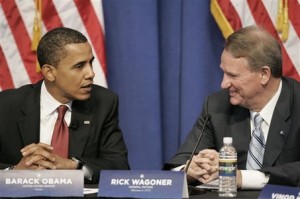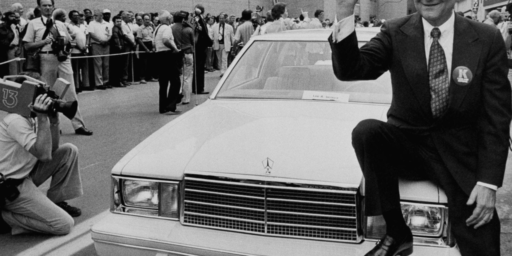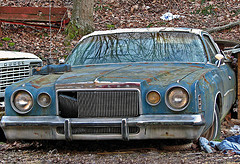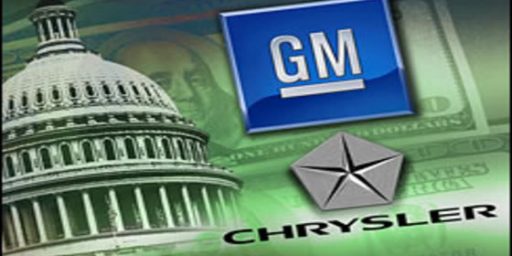Obama Fires GM CEO Wagoner and his Board
 Friday, under the slightly exaggerated headline “Obama to Run GM, Chrysler,” I passed on word that President Obama was going to demand “pretty drastic changes” in order to back further bailouts for the two struggling US auto companies. Well, reductio creep happened before the weekend expired, as the top story at memeorandum shows. I’ll let others chose the headlines:
Friday, under the slightly exaggerated headline “Obama to Run GM, Chrysler,” I passed on word that President Obama was going to demand “pretty drastic changes” in order to back further bailouts for the two struggling US auto companies. Well, reductio creep happened before the weekend expired, as the top story at memeorandum shows. I’ll let others chose the headlines:
- GM CEO resigns at Obama’s behest – Politico
- GM Chief to Resign at White House’s Behest – WaPo (A1)
- Government Forces Out Wagoner at GM – WSJ
- U.S. Moves to Overhaul Ailing Carmakers – NYT
- US autos task force rejects GM, Chrysler plans – Reuters
- GM CEO Wagoner forced out as part of gov’t plan – AP
- General Motors Chief Rick Wagoner Said to Step Down – Bloomberg
Now, Wagoner’s been at GM for thirty years and running it for eight and the company has continued its decline under his watch. So, maybe it’s time for change. (And hope!) But is Barack Obama really qualified to make that decision? Is Timothy Geithner?
To be fair, the oversight was conducted by a Presidential Task Force on the Auto Industry. It was “comprised of cabinet members and other top officials” but “senior policy aides would handle much of the day-to-day work. The 10 senior aides advising the task force include economists, professors and former Obama campaign aides.” Well, who better than professors and politicos to run a multinational auto company? (If it’ll make you feel better, the team is ” headed by former investment banker Steve Rattner.” That does make you feel better, right?)
According to Bloomberg, the top candidate is GM COO Fritz Henderson who has “run every region, he’s been number two and he knows where all the bodies are buried.” Why would the number two guy be a better choice? That’s like firing the head coach of a 1-15 team and picking the defensive coordinator from the number 32 defense as his replacement.
WaPo‘s Peter Whorinsky reports, “The administration effectively rejected as untenable the business plans that GM and Chrysler had submitted to restructure their companies, saying that neither had fulfilled the terms of the federal loans the companies received in December.”
Chrysler, which the administration believes cannot survive as a stand-alone company, must reach an agreement to partner with the Italian automaker, Fiat, in the next 30 days to become eligible for as much as $6 billion in additional federal loans.
Now, that’s pretty specific! Partner with Fiat in the next 30 days or else! But, why not just let Fiat and others bid on whichever parts of Chrysler they think viable? And why give then $6 billion from the U.S. taxpayer once they’ve been acquired by a foreign firm? Isn’t that effectively a subsidy for Fiat?!
GM, which has shed thousands of workers since the downturn began, must devise a leaner business plan that likely will cut the company workforce and product lines even more than officials had contemplated. It has 60 days to come up with a new approach.
Shut down product lines and put more people out of work! That strikes me as probably necessary given the saturation in the market. But why not just let GM go bankrupt and restructure naturally, then? The point of the government bailout was, after all, to save jobs.
It gets better. According to Neil King and John Stoll at WSJ, Obama’s Poindexters believe “the best chance for success for both GM and Chrysler ‘may well require utilizing the bankruptcy code in a quick and surgical way.'” So, why not just skip ahead again?
More good news:
The clearest losers appear to be the thousands of bondholders and lenders to both GM and Chrysler. In both cases, administration officials said that the companies were burdened by inordinate amounts of debt that would have to be scrubbed. Chrysler’s survival, the administration said, would require “extinguishing the vast majority” of the company’s secured debt and all of its unsecured debt and equity.
To assure consumers reluctant to buy GM or Chrysler cars, the government plans to take the unusual step of guaranteeing all warrantees on new cars from either company. These guarantees would lapse back to the companies once they return to health.
Cool!
Megan McArdle more-or-less approves, thinking it provides good optics even if it’s mostly a symbolic move because, “GM is caught in the jaws of its own structural problems–labor costs, yes, but also its corporate culture, its legacy physical plant, and so forth. Perhaps most perniciously, GM is the victim of a brain drain–it’s difficult to recruit top talent to a dying firm, especially when it’s located in a dying industry.”
Barry Ritholz wonders what took so long.
I am no fan of Wagoners, but I have to ask the geniuses behind the bank bailouts: When are you going to ask the TARP and bailout recipients to step down? Ken Lewis being asked to step aside after many years of running BofA ? How about Blankfein? Pandit? And the rest of the TARP recipients?
Meanwhile, Doug Mataconis at Liberty Papers believes “there’s something shockingly wrong about this. The President of the United States has fired the Chief Executive Officer of an American corporation whose shares are held by millions of people. If the American people don’t realize that there is something horribly wrong about the precedent that this sets, then we are truly screwed.” Barbara O’Brien, though, assures us that this is not actually Communism.
UPDATE: Another AP headline: “Peugeot shares tumble after boardroom shakeup.”
Shares in PSA Peugeot-Citroen tumbled more than 6 percent early Monday after the loss-making French car maker abruptly ousted its CEO and named a long-time steel industry executive to replace him.
Whether this is related or a merely interesting coincidence, we’ll see.
UPDATE II: Dave Schuler wonders “what market niche the Obama Administration thinks that GM will compete in? They clearly disapprove of light trucks and SUV’s, the area in which GM has been making most of its money lately.” In some detail, he explains why luxury cars, mid-size vehicles, and sub-subcompacts are not viable options, either. And Kate McMillan notes that “American hybrid sales fall off a cliff.”
Really, though, worrying about what kinds of vehicles people will be willing to spend money on is so 2007. Now that we’re socializing the auto industry, we’ll buy whatever cars are permitted.
Update (Steve Verdon): That last line maybe somewhat prescient, given that while California is not banning black and other dark colored cars yet, it is definitely something that some have been thinking about.






Wow, I guess all that community organizer crap paid off, Obama now knows how to run a car company. Good thing for us.
Because the combination of the 2005 Bankruptcy Act and the financial crisis means that Chrysler and GM’s only option would be Chapter 7, which means that Chrysler and GM would be liquidated and pretty much everybody at those companies would be out of a job. As would their suppliers. Their suppliers also supply Ford and Toyota’s American plants, which means putting those jobs at risk too.
So, it seems to me that Obama is probably trying to prevent sudden, massive job loss. Whether he will is another question, but that’s the motivation.
I’m sure that there will be some carping, but this was a really good move. I had a lot of hope when Wagoner came on board, as he’s a really congenial and smart guy who seemed to have a lot of big plans, but he continually took the safe and less painful route everytime. He’s just not the type of Jack Welsh-like CEO who could restructure GM in the way it needs. Fritz is a much more capable guy for the job, although GM could really use a guy like James Skinner from McDonald’s to rework the company.
As to the optics, obviously most people will like to see a scalp or two. And it is a good thing that the task force is showing its teeth. Hopefully, Obama can strike the fine line of protecting the taxpayers and not micromanaging our investments. I would definitely say that this was a reasonable move by those standards.
John Cole is teh prescient:
Which of the executive powers given the President of the United State is the one that allows him to fire a CEO of a publicly held corporation? I do not want the government to have that kind of power. Next thing you know, poeple they don’t like, or don’t like them will be out of work. That is a real slippery slope, and a steep one. There are some that will defend this move. Those are the some people who said Bush was stealing their freedoms. This thief is really stealing your freedoms. Wake up!
I opposed the bailout, but since it happened anyway, here’s my response. The minute GM (and any other company) took government money, in my mind, they ceased to exist as a entity that had any say over their own operations and management. If they didn’t want that level of government meddling, they should have remained solvent or filed for bankruptcy. Period.
Alex, I think that’s a great exaggeration but even if so the solution to that is to subsidize the workers rather than the company. Where do you think GM will become competitive? How is it going to survive in its current form unless we’re willing to subsidize it indefinitely?
Dave,
I agree that subsidizing the workers is the superior policy and that GM should be allowed to die. But that’s even LESS politically feasible.
Well, if you don’t want government fingers in your business: (1) don’t get too big, (2) don’t fail, and (3) don’t fly down to Washington to beg.
I’ll defer to Alex’s expertise on the specific bankruptcy issues, but I’d say that bankruptcy is not quick unless you have a prepackaged plan agreed to by all the interested parties. That’s not been forthcoming, has it?
Also, I believe the numbers are (I’d have to check) that most reorganizations fail and are converted to liquidations. Filing bankruptcy is not a means to avoid going out of business, unless its your only means.
If GM is owned by the Government, (us) and they are to compete with non government owned automakers. Is it not possible for them to force companies like Ford out of business (at least in the US)? There are bankruptcy proceedures that deal with situations like what is happening to GM. It is not the job of government, at least as how the founders envisioned it, to support private or public companies and corportations. Government has no expertise in these areas. Further, assuming good will on the part of government has been a mistake in the past, historically and will prove to be so today.
Anyone think the GM brands could or should be separated? Buick and Cadillac broken off from Pontiac and Chevrolet. Let the chips fall where they may. Folk say they would be liquidated. Who would buy these facilities? Can I get a government loan so I can own Corvette? Not one but the whole thing.
Washington is f’d up, but not quite that f’d up.
Let’s not forget that the government couldn’t run an established whore house. They’ve tried and failed.
So now we’ll have the Presidents’s handpicked man spending US taxpayer bailout money to beef up production at more efficient robotic overseas plants while laying off costly American workers.
I hope that Obama campaign machine has a supercharger.
is a far cry from
and
The government isn’t forcing GM or Wagoner to do anything. What the government is doing is refusing to loan money to GM unless and until GM acquiesces to certain conditions that the government believes will improve the likelihood of that loan being paid back.
So unless you believe that the government should be making unconditional loans to GM, I don’t see how you can complain about this. Even if you are against any lending or bailouts at all, you have to agree that lending with conditions is better than lending without conditions.
And yet if it was a private holding firm refusing to loan GM money unless these same conditions were met, you free market believers wouldn’t have a problem with it.
Because they don’t have the coercive power of the state.
I am and I am. I am dubious of this particular set of conditions, which presume that a bunch of yahoos with zero experience in the auto industry are better able than the board of GM to decide how to run a car company.
Michael, I guess by your remark you do not believe in the “free market”. Since your forebears moved to this country just for that reason. That is, because it offered opportunity not available anywhere else. Now, people such as yourself wish to modify the best system ever developed. Would not be so bad, but you cannot point to a successful Socialist system. Not one where liberty exists. Under our system of government, you are free to succeed as well as fail. If that does not suit you, I suggest you do as your forebears did, and immigrate to the socialist nation of your choice. That way we freedom loving people can continue to suffer our own ignorance as to the benefits of government control cradle to grave. Be advised. There are many of us, lots of veterans, who believe liberty is worth our blood and the phrase “Don’t Tread on Me” still applies. Patrick Henry said it best. Give me liberty or give me death. The first part is easy, the second part could cost you.
Thanks James. That is the issue. I didn’t vote these people to represent me in a Car company buyout. They have difficulty enough doing what they were sent to Washington to do. Like a previous poster noted. The government could not even run Mustang Ranch. That is sad.
LOL.
Show me the real coercion in this case, in the real world, and not your fevered dreams.
This is only happening because the businessmen at GM came to Washington to beg. The coercive state did not fly to Detroit and start … you know, coercing people.
Looks like this comment from Odo slipped by everyone:
In other words, don’t be too much of a success.
Oh, yes they did. the EPA, CAFE, Governmental backing for unreasonable union demands, deamnds for ‘alternative energy’ vehicles and electric cars nobody will buy… are all on the list of why GM was forced to beg.
This is not a market failure, freind, this is a government-create crisis.
The labor union exemption from anti-trust laws set up the pattern bargaining practices that kept out the competition and tied the Big Three together. G.M. doesn’t just fail; Ford fails, though by most accounts its done better to shore up its position the last few years.
One wonders what motivates the firing of Wagoner, and I wonder if it is to force G.M. to fail in a way that minimizes damage to Ford. That may be smart politics and economics, but it’s not the government acting merely as a lender. If a lender did that, it would be going to jail.
I mostly meant it in the context of the second, but that with all three you’ve really got no room to complain. GM did go to Washington. Obama did not raid a big profitable company minding its own business.
You don’t see me recommending changes at Ford. You don’t see Obama doing that either. Or at FedEx, or at Microsoft, or at Unilever.
That said, I do think that “to big” in the sense of monopoly is another question. I think monopolies require special oversight. Feel free to go off the rails with that one.
BTW Bithead, you do remember that James and David have both said the answer to “too big to fail” is to not let companies get too big to fail.
It wasn’t coercion that made Wagoner come down to the Capital and ask for a loan. And it’s not coercion for the lender to put conditions on the loans they make. The only reason the government is even involved in this is because no private entity wanted to make GM the loan.
If you think the conditions are bad ones, then you should argue that point. But you didn’t, you argued that it is bad for the government to be making those conditions.
I understand what it is, how it works, and how it breaks. I don’t have faith in it having any magical abilities.
Um, they largely operated under the same government that existed in their home country.
See now you’re making assumptions on things you have no information about.
I don’t think actual libery-loving patriots would appreciate you adding yourself to their ranks.
The meaning is that companies should not make themselves indispensable to the nation’s economy if they want to operate without government control. Here “big” means invasive, not successful.
Once your existence becomes necessary for the wellbeing of a significantly large number of citizens, the government has a prerogative to ensure your continued existence though whatever means it deems necessary.
Speaking of government meddling. Does anyone know if this has any merit:
http://zerohedge.blogspot.com/2009/03/exclusive-aig-was-responsible-for-banks.html
Its beyond my field of expertise.
And where exactly is that listed among the enumerated powers in the constitution?
yes, it was, and that’s exactly the point. The auto industry was already being micrmanaged to the point of extinction. Look around… the businesses that are being bailed out are already and without execption, among the most regulated of industries. I suggest it’s that micromanagement that caused bailouts to be a need.
That’s not too surprising Drew. The “operating profits” were sketchy anyway. And we did know that the gov was pushing money through AIG to other illiquid (or insolvent) entities.
As I quoted in the other thread, “the writedown of assets in the US has exceeded the provision of new capital.”
I think maybe we just had a false spring.
^^This.
I guess the actual shareholders are already written off (for GM). Looking at the major holders of GM stock, 49% is owned by institutions and mutual funds (much of which are in retirement accounts).
Immediately jumping to eye are STATE STREET CORPORATION (the number one servicer of pension funds among many other #1 rankings) and COLLEGE RETIREMENT EQUITIES FUND.
odo –
Its not like I was born yesterday, but I’m having trouble getting my head around this. We have a taxpayer subsidized entity doing favorable trades with another entity (with private and taxpayer interests) to effect a transfer of wealth. And it is being done with little transparency. Meanwhile, the recipients of this taxpayer largess are one set of private equity holders and creditors vs another.
Oh, well. I suppose Obama’s announcement today that shareholders of Citi and Bof A get GM cars for half price is just a variant of the AIG maneuver.
But is Barack Obama really qualified to make that decision? Is Timothy Geithner?
Pretty much every human being who has not been on GM’s board in the last decade is qualified to make that decision.
It’s not something that makes me feel real comfortable either, Drew.
The best face on it is that the government needed to throw money hard and fast to prevent some kind of real meltdown, and that they used AIG as their conduit because it’s the lever they had.
But that hinges on something that is pretty opaque to those of us outside the Fed and Treasury … how bad were things really?
(It does parallel the WMD discussion, certainly.)
Spent a few weeks in rural France last year. Have spent quite a chunk of my life building houses and doing remodels. I noticed driving around over there that that business is huge – new housing (actual single-family houses), remodels, renovation everywhere. One thing you never see is sub-contractors (plumbers, electricians etc) driving around in giant dual-axle trucks or huge panel vans – they simply don’t exist over there. They drive around in tiny little “trucks” that are the size (or smaller) of your average American sedan. So I think a lot of the justification people use for buying Ford F350’s and such, “I need it for work”, is bogus.
Where I live now, only about one in 10 big trucks have a scratch on them. They’re obviously being used for ordinary transportation. I see them and I’m reminded of how a female character once described Don Johnson’s Ferrari Testarossa in Miami Vice–she called it a “Testosterona”.
jghedge, your argument has more to do with CAFE standards than anything. We don’t require trucks to be as fuel efficient as other vehicles, because we recognize some of them have more intensive needs than regular transportation. That’s a loophole built to be exploited. It’s a loophole that I’m sure management and labor at Detroit support.
A fuel tax made more sense.
You lost me earlier PD, but you got me back with that.
I think the percentage of people who actually use huge trucks for work is about 25%. With the rest, there is something else going on.
When you hear a grown man talking about “his rig”, and he is not a professional trucker, well, you have to wonder if you are drifting into Freudian territory…
So I think a lot of the justification people use for buying Ford F350’s and such, “I need it for work”, is bogus.
Unless of course you do. We have a Ford Excursion-it is huge, but it can hold all four of our kids, and it can hold a sheet of drywall. The truck/SUV does double duty for my husband-who has to haul tools, drywall (at times) and other large things to various jobs, and it has the advantage of his being able to lock his stuff inside which a regular truck doesn’t provide.
Where I live now, only about one in 10 big trucks have a scratch on them. They’re obviously being used for ordinary transportation. I see them and I’m reminded of how a female character once described Don Johnson’s Ferrari Testarossa in Miami Vice–she called it a “Testosterona”.
Just a point-my husband uses our truck/suv for work and it doesn’t have any scratches on it. Why do you think a truck used for work would have to have scratches?
That said-I am sure there are people who drive their trucks and SUV’s purely for show, but I wouldn’t make assumptions based on whether or not it had scratches on it.
This is beautiful, no poetic justice, the Communist workers union party votes in mass to elect this fool now he is running their company. I “hope” it happens to them all and that it will “change” them into what they deserve to be, barely paid slaves to the master that they all need want and admire.
Union yes, BOX, CHECK!!!!!!!!! suckers!!!!!!
Oh I cant wait till he collapses the public school system and and has to become its master and turns all the teachers into underpaid slaves to his false ideology…..
oh wait………what im I thinking that all ready happened, crap!
You don’t know many public school teachers, do you?